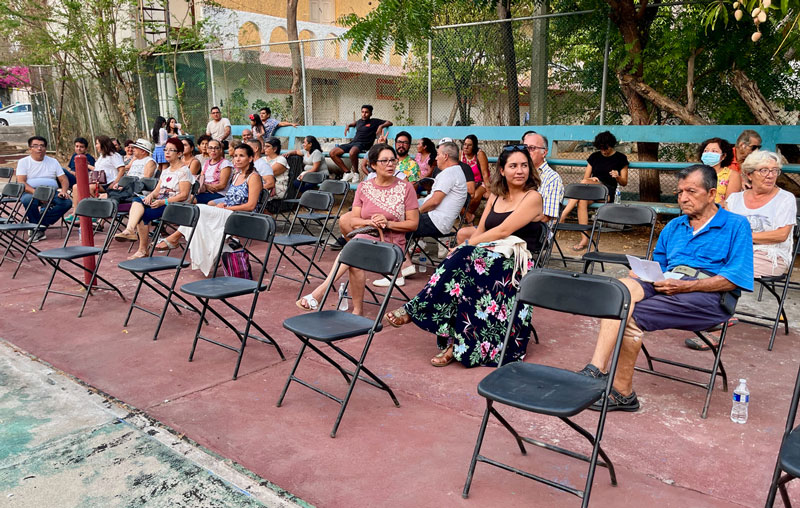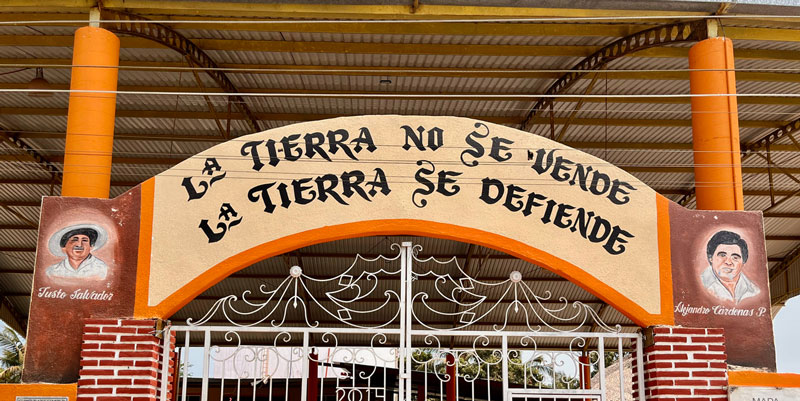
Photo: Barbara Joan Schaffer
Land in Puerto Escondido
The following is based on my investigations and experiences from having lived in Puerto since 2005. For sure it is not the last word on the subject, and others will have diferent opinions. ¡Viva Puerto! 17 and ¡Viva Puerto! 25 for more information.
IN CASE YOU HAVEN’T HEARD, IT’S RISKY BUYING PROPERTY on the Coast. Most people who buy land here are willing to take the risk, so it’s not a problem for them. But I very much suggest not putting your life’s savings into a property here. And it’s not just about communal land. Even if you buy property in the zone that was expropriated and privatized in 1970, there is the risk of the seller having a false title to the land. Yes, you will win in court and hopefully get your money back, but consider the legal fees.
Outside the area that was expropriated by the federal government in 1970, all the land in San Pedro Mixtepec and Santa María Colotepec is communal. Simply put, you get clear title to land in Hidalgo, Bacocho, Rinconada, Carrizalillo, Costa Chica and other communities in Puerto Escondido up to the Cerro de la Vieja which is the border between Puerto and Chila. Agua Dulce and Palmarito belong to the Communal Land (Bienes Comunales) of San Pedro Mixtepec, the deeds (escrituras públicas) that are used to sell land there have all the legal validity of the fake IDs people who are underage use to buy liquor.
There is a lot of talk among lawyers and realtors about the privatization of communal property to facilitate the development of the area. I believe this is wishful thinking. This land belongs to indigenous communities who have occupied it since time immemorial. I don’t think it likely that they will give it up.
I’m not a lawyer, but I get emails from strangers asking my advice. One was from a man from California who “just wanted to buy property on the Coast” on communal land. He was frustrated because the lawyers he consulted all gave diferent advice. I told him that what he wanted to do was illegal and that the lawyers were just suggesting ways to get around the law.
Another was from a man who was very interested in buying a large property next to a lagoon. The seller assured him that the land would soon be “regularized”. I had to tell him that regularized did not mean privatized.
A really sad case was an American in his 30s who bought land in the Punta through a corporation. The corporation was given his name. Unfortunately he was not named as any of the owners of the corporation.
Foreigners I’ve talked to in the Punta who have bought their land through straw buyers say they have had no problems. The losers tend to leave, deeply embarrassed.
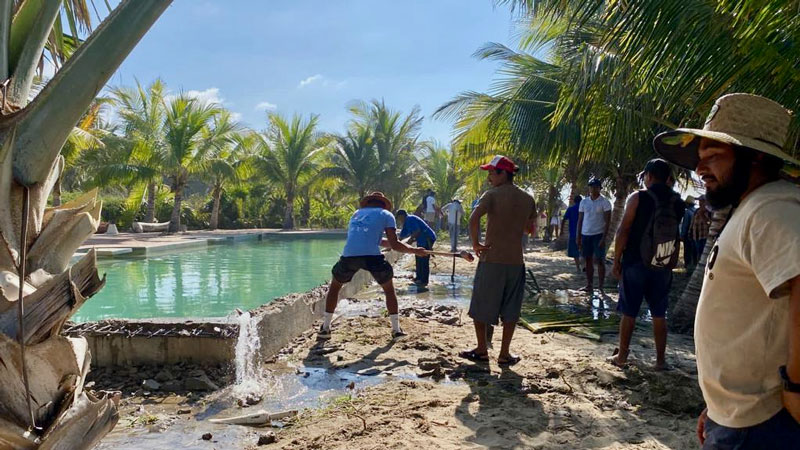
The Commission of Bienes Comunales (Comisariado) is in charge of issuing actas (constancias) de posesión to individuals which gives them the right to occupy a parcel and pass it on to his or her heirs. Communal land cannot be bought or sold; it can only be transferred. So whatever you pay for the property is not registered and no taxes are paid on the sale. The Commission of Bienes Comunales of Colotepec does however charge a one-time fee for the new acta. The amount depends on the distance from the beach.
Bienes Comunales owns the land, but does not administer it. That is the job of the Municipality (Municipio). The Municipio issues the building permits. Bienes Comunales and the municipal government do not always see eye to eye.
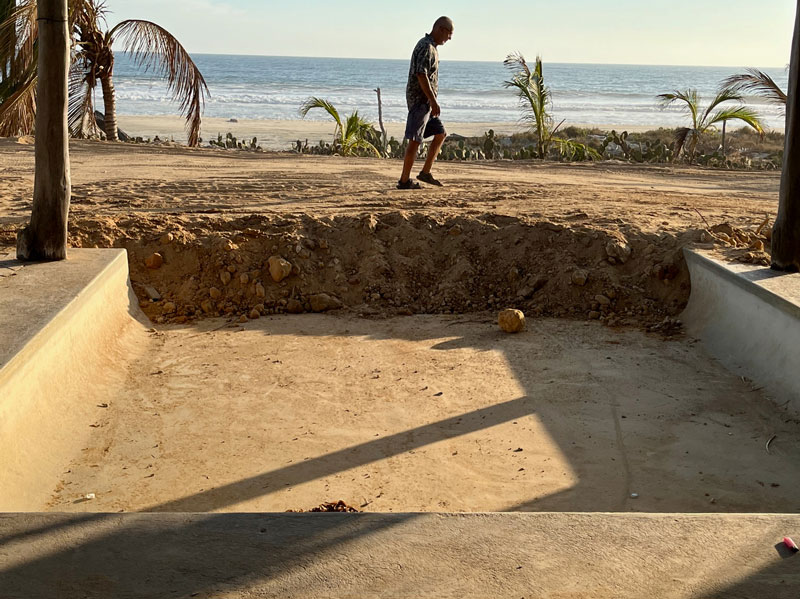
And then there are the Delegations, the local authorities of the communities inside the Municipio. The Delegations work with both the municipal government and Bienes Comunales. There are around 40 delegations in San Pedro Mixtepec and 68 in Colotepec.
A good example of how the three agencies work together is the case of the oceanfront boulevard in the delegation of El Tomatal in Colotepec. In the early 2000s, the assembly of Bienes Comunales voted to set aside a 30-meter-wide strip of its beachfront land that bordered the Federal Zone (the coastal area belonging to the federal government) for the construction of a boulevard. Of course, Bienes Comunales didn’t have the resources to actually build this road. It wasn’t until 2021 that the assembly of residents of El Tomatal voted on a community service (tequio) project for its construction. Most delegations require tequios from their residents when they are voted on by the residents. Tequios include building and maintaining roads, schools and health centers. Since communal land is not private, it cannot collect property taxes. But each household is responsible for sending a member to perform the physical labor of the tequios.
The assembly also voted to ask the Municipio to provide the necessary machinery for making this dirt road, which it did. Construction began in 2022. The project hit a snag, however, when it was discovered that the owner of a small hotel had built a pool on the land designated for the boulevard. The owner refused to allow the road to go through what he claimed was his land, at which point a member of the commission of Bienes Comunales joined members of the delegation and destroyed the pool so the road could go through.
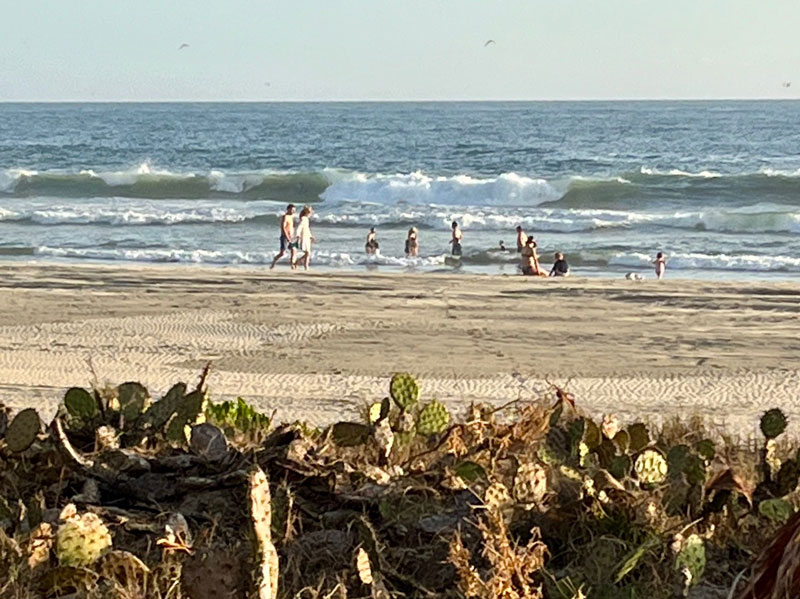
So far, none of the neighboring delegations have voted to build the road, so it only runs through El Tomatal. But at some point in the future, people with beachfront houses in communities like La Plataforma and Tierra Linda may fnd that their delegations have also voted to construct a boulevard.
Note that you do not have to be a Mexican citizen to participate in the assemblies of the delegations, nor does being a foreigner exempt you from performing the tequios. However, if you cannot or do not wish to perform the manual labor, you can pay an annual fee set by the delegation. If you ever want to transfer your acta (i.e. sell your property), you must present a certifcate of no debt (constancia de no adeudo) from the delegation showing that you either performed the tequios or paid the annual fee.
The beauty of the system of communal lands on the Coast is that they keep changing their rules to accommodate changes in land use, without giving any thought to Mexico’s laws concerning Social Property (bienes comunales and ejidos).
For example, the Agrarian Law says that actas de posesión have to be approved by the assembly of comuneros. In fact, both the commissions of Bienes Comunales of San Pedro Mixtepec and Colotepec routinely issue actas without seeking the consent of the comuneros.
Legally, only individual Mexican citizens, not corporations, can have actas. Nevertheless, Colotepec issues actas to Mexican corporations, which can be wholly owned by foreigners. They even put actas in the names of foreigners who present a bank trust (fdeicomiso) for the property. Never mind, that the fdeicomiso was issued on the basis that the land was private and that it had a deed from the District of Pochutla (which includes Colotepec.) It costs thousands of dollars to get this fake escritura and then the fdeicomiso, but it’s worth it for people buying million-dollar homes. Bienes Comunales also charges a hefty sum for issuing actas close to the beach.
And so it is that Bienes Comunales encourage development and the communities prosper without needing for the land to be privatized.
The Coast ofers many opportunities for people of all nationalities who choose to live here and respect the local land use customs. But if you look at the land as an investment, I think you would probably have an easier time elsewhere
